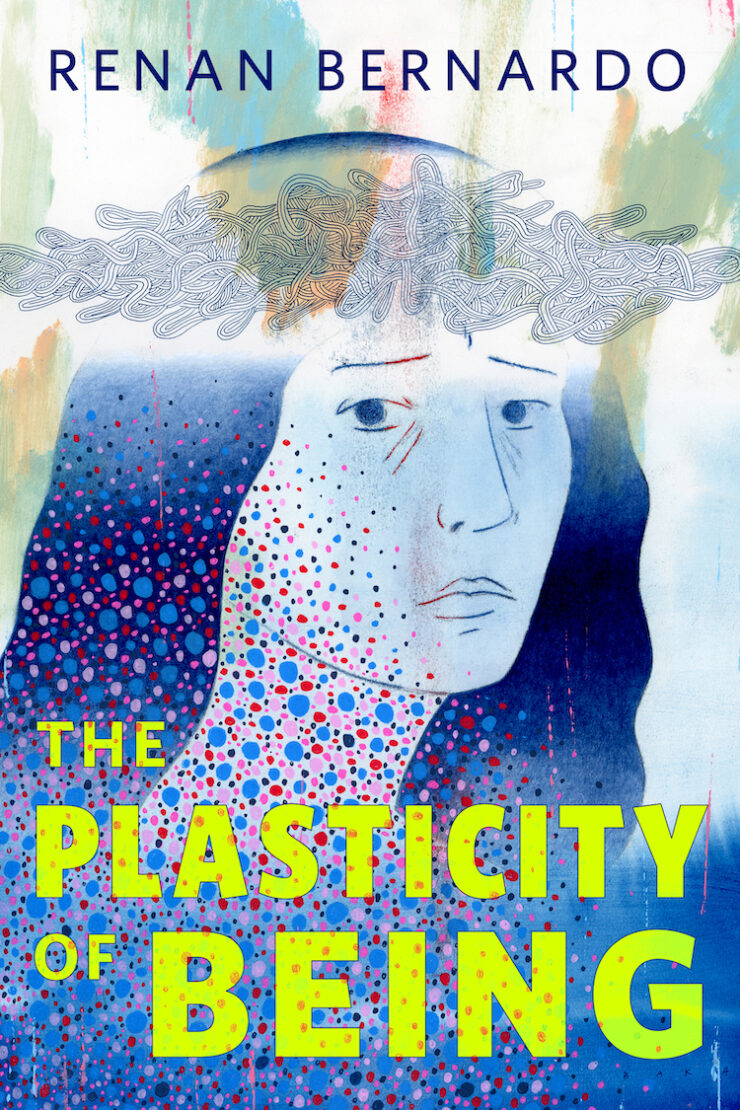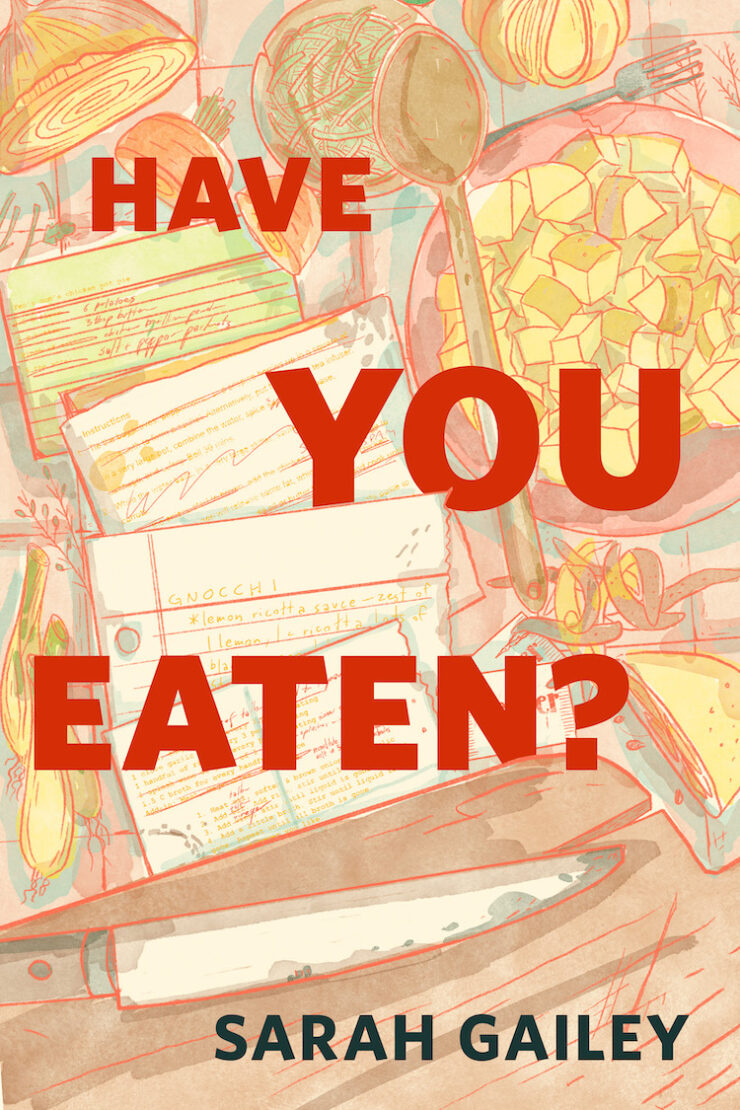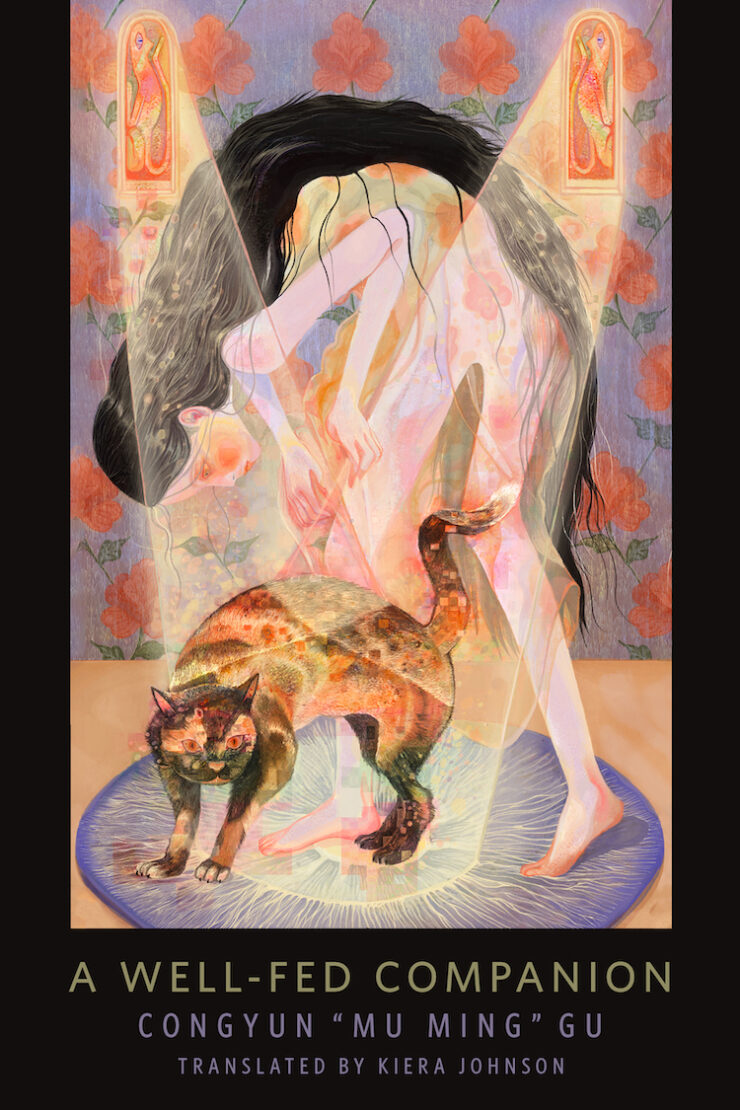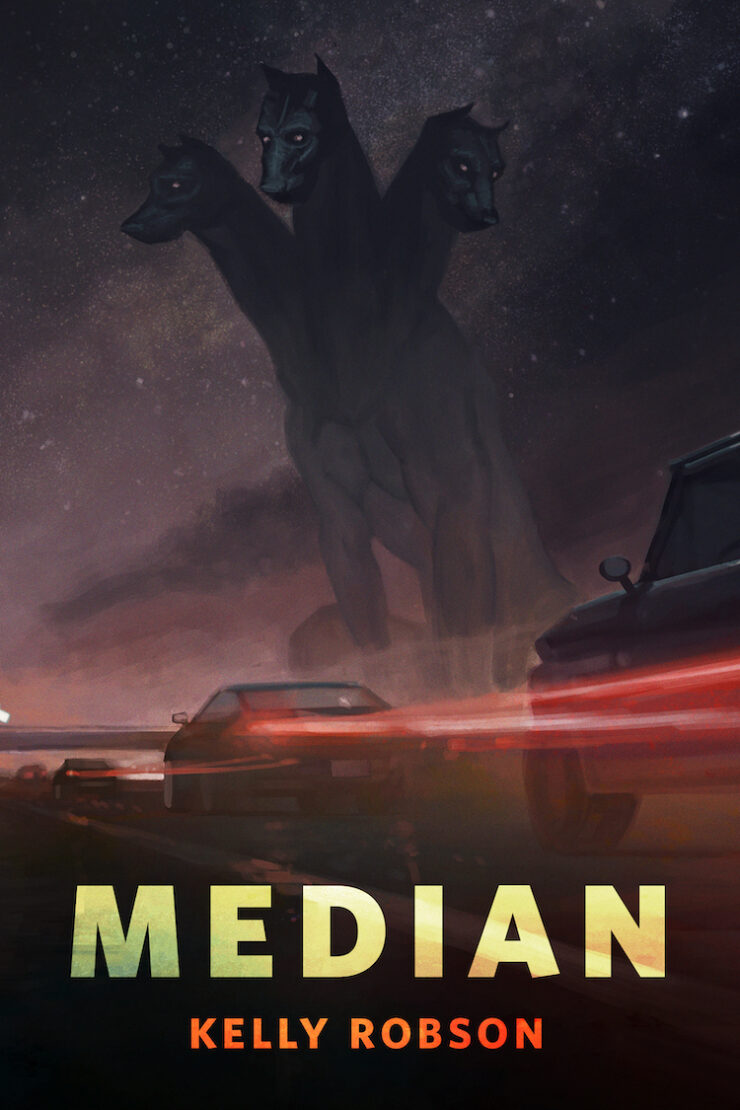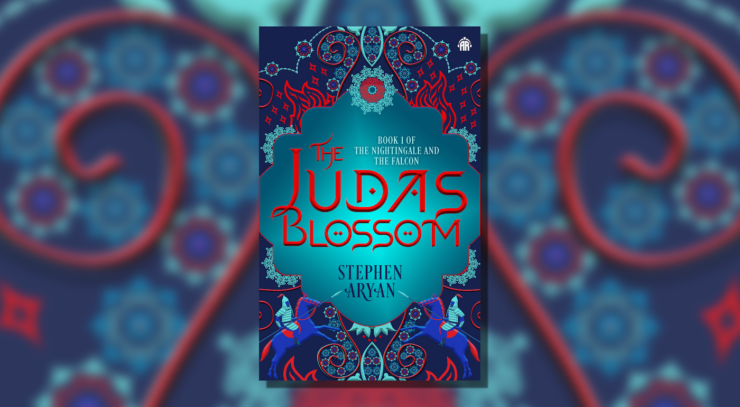In the shadow of his grandfather Genghis, Hulagu Khan, ruler of the Ilkhanate, is determined to create a single empire that covers the entire world. His method? Violence.
We’re thrilled to share an excerpt from The Judas Blossom, the first book in a new historical fantasy series by Stephen Aryan, out from Angry Robot on July 11.
1260, Persia:
Due to the efforts of the great Genghis Khan, the Mongol Empire covers a vast portion of the known world. In the shadow of his grandfather, Hulagu Khan, ruler of the Ilkhanate, is determined to create a single empire that covers the entire world. His method? Violence.
His youngest son, Temujin Khan, struggles to find his place in his father’s bloody rule. After another failure, Temujin is given one last chance to prove himself to Hulagu, who is sure there is a great warrior buried deep inside. But there’s something else rippling under the surface… something far more powerful and dangerous than they could ever imagine…
Reduced to the position of one of Hulagu’s many wives, the famed Blue Princess Kokochin is the last of her tribe. Alone and forgotten in a foreign land, Kokochin is unwilling to spend her days seeking out trivial pursuits. Seeking purpose, she finds herself wandering down a path that grants her more power than a wife of the Khan may be allowed.
Kaivon, the Persian rebel who despises the Mongols for the massacre of his people, thirsts for revenge. However, he knows alone he cannot destroy the empire. When given the opportunity to train under the tutelage of Hulagu, Kaivon must put aside his feelings and risk his life for a chance to destroy the empire that aims to conquer the world.
CHAPTER 3
Kaivon
Kaivon watched in horror as the last of his people was cut down in the street by the Mongol warriors.
“We have to go. Now,” said his brother, Karveh, pulling him by the shoulders.
Buy the Book
The Judas Blossom
A dying woman reached towards Kaivon, pleading for help. When the Mongol stabbed her through the heart Kaivon was sure he saw relief in her eyes. Just to be free of her suffering.
Karveh shoved him and then both of them were running, ducking between buildings, racing through gardens and hurdling over walls. The city of Shiraz was a beautiful place and it had been home his entire life, but it no longer felt safe. Kaivon ran until his lungs burned.
The plan had been simple. Wait until the end of the day and then kill everyone in the census office. By that time the workers inside would be tired, distracted and there would be less people waiting on the street. Some of those working for the Mongols were Persian, but in Kaivon’s mind they were traitors.
He’d really wanted to kill the fat Mongol. There was a rumour that he was related to Hulagu Khan. Kaivon didn’t know if that was true but the Mongol was important enough to have a bodyguard, which made him a valuable target.
“I have to stop,” said Karveh, one hand pressed against his side.
“Keep walking,” gasped Kaivon, taking in their surroundings. “Just a little further.”
Up ahead was a monument dedicated to Rumi, the popular poet and scholar. The statue was a crude representation, but the sculptor had captured something majestic in his expression. The statue was at the centre of a small public garden, surrounded by benches and fruit trees. It was a quiet oasis in the middle of the city. A place where people came to read and relax with their families.
Kaivon sat down on a stone bench with his brother. Both of them did their best not to look suspicious, which was difficult given the circumstances. There were a couple of other people, reading or talking, but they paid no attention to the brothers.
“I don’t understand what happened,” said Karveh.
“It was the masked bodyguard. We took too long before attacking. We should have in gone sooner,” said Kaivon.
“There were too many innocent bystanders on the street. They could have been hurt.”
“Our people were hurt,” hissed Kaivon, trying to keep his voice down. “They’re dead. They’re all dead.”
Karveh shushed him, watching as an old couple tottered past, arm in arm. Kaivon stayed silent until they were alone in the gardens.
“If we had attacked sooner, innocents would have died.” Karveh preached as if he was the one who had experience of war.
“Innocents always die in war.” Kaivon fixed his brother with a glare until his looked away.
“Of course, General,” sneered Karveh.
Kaivon grabbed his brother by the collar. “Are you mocking me?”
“Let go.”
“If you’d seen what they did in the north.” Kaivon’s eyes glazed over and he saw the horrors again. “Mountains of bodies. Young and old, men and women. Dead. Slaughtered like cattle. And the children.”
The army had fought bravely in defence of their country, but it the end, it hadn’t mattered. They had been filled with rage and righteous fury, which gave strength to their weary limbs. Unfortunately, even that had run out before the battle was done. Kaivon had killed and maimed until he was covered in blood, climbing over the dead to find the living. But there had been too many, like raindrops in a storm.
The punishment for failing to beat the Mongols had been severe. He’d watched as ancient monuments to their ancestors were torn down. Buildings, full of history and culture, smashed and broken apart. Libraries full of knowledge and accumulated wisdom sent up in flames. Millions of words lost, for all time.
The smell had been overpowering. The air thick with choking black smoke and the stench of charred meat. Kaivon wished it had ended when night had fallen but, in the darkness, the vermin had gathered. Rats and carrion birds and dogs had swarmed over the bodies.
So many of his friends had been killed that after a while it became easier to ask who was still alive. Great leaders were cut down. Other generals led brave charges that ended in agonised screams. Junior officers took huge risks to turn the battle and their lives ended abruptly. The noises had been barely human. Kaivon hadn’t known a person could make such sounds.
He had wanted to stay and fight. To see it through to the end. Against his wishes, he fled south so that his people could fight another day.
“I’m sorry,” said Karveh, bringing him back to the present. “I know you’ve suffered.”
“You should pray for the dead. They need it more than me.”
“I’m not so sure,” said his brother.
“After the first day, we knew that we couldn’t win. Did you know that our leaders surrendered? Hulagu Khan refused and the slaughter continued. For days, Karveh. Not hours. Days. Until nothing remained. How can you rebuild a city if all that’s left is rubble and ash?”
Kaivon left his brother beside the statue and began to walk away.
“Where are you going?” called Karveh.
“I want to be alone. I need time to think.”
“Don’t do anything rash,” said Karveh, as if he were the eldest.
Kaivon walked through the streets until he lost himself in the rhythm of the city. He let the familiar sights, smells and sounds overwhelm his senses until he felt at home and his equilibrium returned.
He passed through a busy market, admiring the bolts of beautiful cloth and the colourful rugs with their intricate designs. The mix of glorious spices and fresh fruit created a heady aroma that bordered on cloying. For a time he stood off to one side, watching people going about their daily lives. Buying and selling. Bartering and laughing with apparent good cheer. At first glance they were oblivious to the truth, but after a while he spotted signs of underlying tension. The furtive glances. The snatches of hushed conversations. A patrol of Mongol warriors walked past the edge of the market, further souring his bad mood. In search of cleaner air, away from the outsiders, Kaivon walked on.
***
As Kaivon passed through the streets many people recognised him, but no one made an overt greeting. With so many Mongol patrols they didn’t want to take the risk. But that didn’t stop them from offering him a sign of respect for all that he’d done. Several placed a hand over on their heart and slightly bowed their head. They didn’t blame him for losing in the north and, despite his own guilt, he was buoyed up by their warmth and admiration.
As darkness fell Kaivon made the long walk home. His legs ached and his heart was still heavy about what had happened. The pain would fade but the regret would remain, driving him on, forcing him to try again.
The basket shop was a modest business and a long way from being a general in the army. It had belonged to his late father and was now his brother’s business.
Letting himself in through the back door he wasn’t surprised to find a candle burning in the store room. Karveh was sat in the corner dozing in a chair, but he came awake as the door squeaked. Kaivon’s brother reached for a dagger but then relaxed and sat back.
“It’s late,” said Karveh. “I was expecting you hours ago.”
“I needed time to clear my head.”
“Do you feel better?”
Kaivon dragged a chair across the room and sat down opposite his brother. “A little.”
At Karveh’s elbow was a pot of tea. He filled a second glass, added a slice of lemon and passed it across. “I’m glad to hear that.”
“What are people saying about the attack?”
“Very little. The Mongols are pretending it didn’t happen. The bodies are gone and the street has been washed clean.”
“It must have something to do with the fat one.” Kaivon began to wonder if the rumours had been true. It would explain the response. Normally such an attack would result in a disproportionate retaliation. Dozens would be killed, whether innocent or guilty. Their homes burned to the ground. A total cleanse to send a clear message about what would happen if anyone else tried.
“Perhaps.” Karveh sat back in his chair, his face wreathed in shadow.
“You think it’s something else?”
“What I think doesn’t matter,” said his brother.
“Of course it does. We’re in this together.”
“Are we? Really, brother?”
“What are you saying, Karveh?”
For a time he said nothing for a time, just stared into the shadows. “While you were out walking, I met with the other rebels.” The last word came out with a sneer but Kaivon couldn’t blame him.
There was no organised resistance. No network of groups trying to repel the invaders. Not yet at least. Everything had to start somewhere and so would too would the resistance. At the moment they had only a few dozen people who were interested in the idea of fighting back. None of them were soldiers but, in Kaivon’s mind, that made them braver. They were willing to risk everything for their country. They were true patriots.
“What did they say?” said Kaivon, putting the wedge of lemon in his mouth before taking a drink.
Karveh sipped at his tea. He had a sour expression but Kaivon knew it wasn’t because of the tea.
“After today, they’re done. They’re out.”
“Who? Who said that?”
“All of them, brother.” Karveh leaned towards him so that Kaivon could clearly see his eyes and the fear behind them. “The resistance is dead.”
“I know today was horrible, and I deeply regret every life that was lost, but it was inevitable that some would die.”
Kaivon had told them, over and over, that this was not a game. They were not noble heroes from ancient legend, slaying white demons and capturing golden crowns. Their war would be fought in the gutters and the alleys, not riding horses on a battlefield. It would be won in the dark, with the knife and the garrote. It would be slow, painful and difficult.
“It doesn’t matter. It’s over.”
“We’ve only just begun,” said Kaivon.
Karveh gripped his hand tightly. “Listen to me. Please. It’s over.”
“I know you’re afraid, but we can’t give up now. We must show them that we’re not a broken people.”
“But we are!” yelled Karveh. “The war is over and we lost. Persia doesn’t exist any more. Now, there is only the Ilkhanate of the Mongol Empire.”
Kaivon pulled his brother out of his chair and shoved him up against the wall. “Never say that. Never!”
“We are a conquered people. You’ve always been braver than me. That was why you became a soldier and I stayed at home. I’m tired, Kaivon. We are all. We don’t have the heart to fight. Not today.”
“And tomorrow?”
“I don’t know.”
“So that’s it. You’re going to live like a dog, for the rest of your life, on a Mongol leash.” Kaivon felt sick to his stomach. The air in the room was stifling.
“Of course not,” spat Karveh, raising his voice. “We all want to be free, but now is not the right moment. We need bide our time, rebuild our strength and then attack.”
“And what should I do until then? Sell baskets with you?”
Karveh shrugged. “There are worse ways to make a living. It has fed my family for many years.”
The Mongolians had pacified the people with low taxes, the freedom to worship, and a semblance of law and order, but their peace had been bought with desecration, destruction and the murder of thousands.
“I cannot stop. I will not.” Kaivon took a deep breath and found that the air tasted bitter. It wasn’t just the house. It was the whole city. This was no longer his home.
“What will you do?” said Karveh.
“Cut the head off the snake. Hulagu Khan must die.”
“That’s impossible. He’s surrounded by an army, guarded day and night. Even if, by some miracle, you succeeded, they would just replace him with someone else. Maybe someone worse.”
Kaivon shrugged. “What else can I do?”
The muscles in Karveh’s jaw twitched but he didn’t argue. He knew it would be pointless. It had been this way ever since they were boys. Kaivon would relentlessly pursue his goal with single-minded focus. Either he would accomplish it or would die in the process. There was nothing in between.
“Then I wish you good luck,” said Karveh, embracing him tightly, “and I will see you again soon.”
It was a lie. They both knew it. Kaivon would not be returning from his trip to the north. Not this time. He’d beaten the odds so many times, but this was different. He had no allies. No strategy. Not even a vague plan, just a strong desire for vengeance.
Kaivon’s only wish, before he closed his eyes for the last time, was to see Hulagu Khan dead at his feet.
Excerpted from The Judas Blossom, copyright © 2023 by Stephen Aryan.


